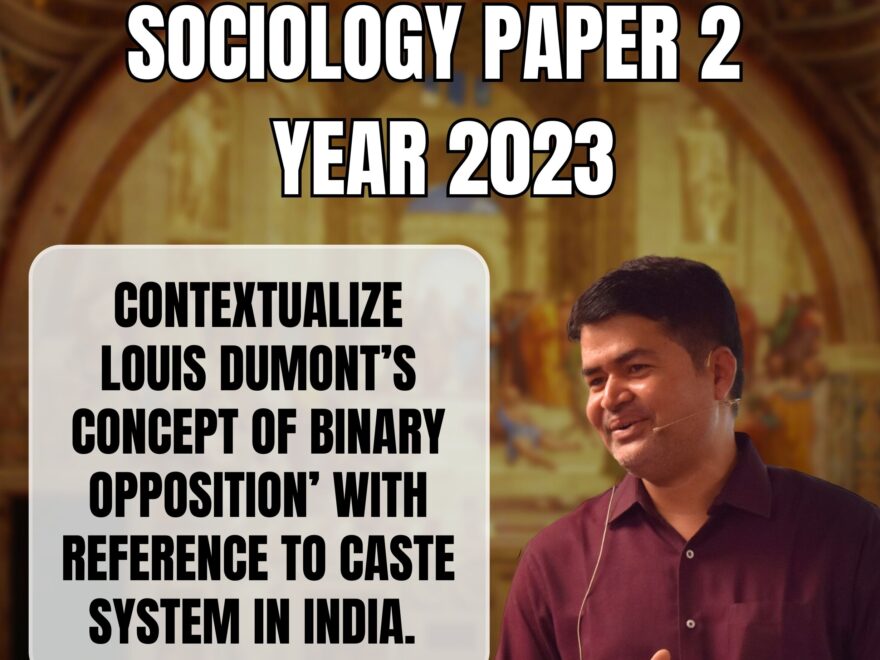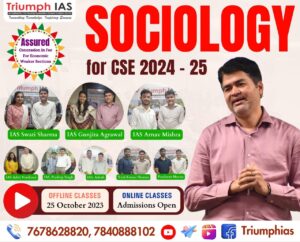A Contextualize Louis dumonts concept
of binary opposition with reference
to caste system in India.
Section: A.
Sociology Paper 2023 Analysis.
Relevant for Paper 2: Unit-12 System of Kinship in India
Question 3 (a): A Contextualize Louis dumonts concept of binary opposition with reference to caste system in India.
(20 Marks)
|
Introduction: Briefly ExplainGenesis of Idea of Binary Opposition Main Body: Detailed Explanation of Idea of Concept of Binary Opposition Pure and Impure in Context of Caste System as Propounded by Louis Dumont , Limitation of the Idea Conclusion: On Changing Nature of Caste and Idea of Substantialisation of Caste. |
Introduction:
- Louis Dumont borrowed the idea of binary opposition from Lewis Strauss. Binary opposition refers to a pair of related terms or concepts that are opposite in meaning. Dumont employed binary operation of purity and pollution in context of caste in India. Dumont’s analysis of the caste system is based on the classical literature, historical examples, and the ideology of the caste system.
- He was also deeply influenced by BougIe’s cultural explanation of caste and his ideas that division of labour in caste system is not on economic basis, but on cultural basis and hence, is not exploitative. BougIe further argues that position of every other caste is relative to Brahmins and these castes evaluate themselves taking the position of Brahmins as reference and every caste is concerned with its boundary maintenance.
- Louis Dumont condensed the three core features of Bougle into one all-encompassing principle of caste as an ideology of separation of pure and impure.
Main body:
Concept of Binary opposition Pure and Impure in context of caste
- Dumont argued that caste is different & district social structure; it should not be compared with other social structure like class. He termed this structure as homo hierarchicus structure.
- He views caste system in terms of ideas and values, i.e., caste system is an ideology peculiar to Indian society. Ideology of Indian society is in binary opposition with Western ideology, modern against tradition, holism against individualism, hierarchy against equality, purity against pollution and status against power. Dumont emphasised on ideology because it is also reflected through ancient texts.
- According to Louis Dumont the Brahmins, assigned with the priestly functions, occupied the top rank in the social hierarchy and were considered ‘pure’ as compared to other castes, whereas the untouchables, being ‘impure’, and segregated outside the village.
- Untouchables were not allowed to draw water from the same wells from which the Brahmins did so. Besides this, they did not have any access to Hindu temples, and suffered from various other disabilities.
- He conceptualized caste as opposition of pure and impure. Three elements are central to his analysis-
- Separation on the basis of rules of the caste in matters of marriage and contact, whether direct or indirect (food)
- Interdependent of work or division of labour, each group having, in theory or by tradition, a profession from which their members can depart only within certain limits;
- Finally, gradation of status or hierarchy, which ranks the groups as relatively superior or inferior to one another.
- He identified a number of pure and impure practices which are attached with notions of purity and impurity. Endogamy, cleanliness, vegetarianism are considered pure and superior. Accordingly, impure occupations are separated from the class of sacred/pure occupations. Pure and impure are attached to not only occupation, but to the entire structure of ideas.
Limitation of idea of binary opposition in understanding of caste as propounded by Louis Dumont
- Yogendra Singh argued that Dumont failed to grasp change brought in Indian society by a modern democratic and egalitarian state which is based on the modern constitution.
- His binary perspective of purity and pollution also does not hold true in a lot of contexts, for instance tribal believe in sacredness instead of purity and pollution.
- Harold Gould believes that lower caste people imitate the way of life of higher castes not because of cultural aspects of purity and pollution but socio-political and economic dominance that higher castes possess.
Conclusion:
Caste is not an unchanging structure. Simultaneously, it is also true that caste has religious, cultural as well as ritualistic backing. But over a period of time caste group has organised themselves as pressure group to secure economic and political gains. Louis Dumont’s calls this phenomenon as Substantialisation of caste. Hence in present context the caste has expanded its scope beyond the explanation of binary opposition .
Related Blogs…
To master these intricacies and fare well in the Sociology Optional Syllabus, aspiring sociologists might benefit from guidance by the Best Sociology Optional Teacher and participation in the Best Sociology Optional Coaching. These avenues provide comprehensive assistance, ensuring a solid understanding of sociology’s diverse methodologies and techniques.
META TAGS: A Contextualize Louis Dumonts concept of binary opposition, A Contextualize Louis Dumonts concept of binary opposition, A Contextualize Louis Dumonts concept of binary opposition, A Contextualize Louis Dumonts concept of binary opposition, A Contextualize Louis Dumonts concept of binary opposition, A Contextualize Louis Dumonts concept of binary opposition, A Contextualize Louis Dumonts concept of binary opposition, A Contextualize Louis Dumonts concept of binary opposition
Why Vikash Ranjan’s Classes for Sociology?
Proper guidance and assistance are required to learn the skill of interlinking current happenings with the conventional topics. VIKASH RANJAN SIR at TRIUMPH IAS guides students according to the Recent Trends of UPSC, making him the Best Sociology Teacher for Sociology Optional UPSC.
At Triumph IAS, the Best Sociology Optional Coaching platform, we not only provide the best study material and applied classes for Sociology for IAS but also conduct regular assignments and class tests to assess candidates’ writing skills and understanding of the subject.
Choose The Best Sociology Optional Teacher for IAS Preparation?
At the beginning of the journey for Civil Services Examination preparation, many students face a pivotal decision – selecting their optional subject. Questions such as “which optional subject is the best?” and “which optional subject is the most scoring?” frequently come to mind. Choosing the right optional subject, like choosing the best sociology optional teacher, is a subjective yet vital step that requires a thoughtful decision based on facts. A misstep in this crucial decision can indeed prove disastrous.
Ever since the exam pattern was revamped in 2013, the UPSC has eliminated the need for a second optional subject. Now, candidates have to choose only one optional subject for the UPSC Mains, which has two papers of 250 marks each. One of the compelling choices for many has been the sociology optional. However, it’s strongly advised to decide on your optional subject for mains well ahead of time to get sufficient time to complete the syllabus. After all, most students score similarly in General Studies Papers; it’s the score in the optional subject & essay that contributes significantly to the final selection.
“A sound strategy does not rely solely on the popular
Opinion of toppers or famous YouTubers cum teachers.”
It requires understanding one’s ability, interest, and the relevance of the subject, not just for the exam but also for life in general. Hence, when selecting the best sociology teacher, one must consider the usefulness of sociology optional coaching in General Studies, Essay, and Personality Test.
The choice of the optional subject should be based on objective criteria, such as the nature, scope, and size of the syllabus, uniformity and stability in the question pattern, relevance of the syllabic content in daily life in society, and the availability of study material and guidance. For example, choosing the best sociology optional coaching can ensure access to top-quality study materials and experienced teachers. Always remember, the approach of the UPSC optional subject differs from your academic studies of subjects. Therefore, before settling for sociology optional, you need to analyze the syllabus, previous years’ pattern, subject requirements (be it ideal, visionary, numerical, conceptual theoretical), and your comfort level with the subject.
This decision marks a critical point in your UPSC – CSE journey, potentially determining your success in a career in IAS/Civil Services. Therefore, it’s crucial to choose wisely, whether it’s the optional subject or the best sociology optional teacher. Always base your decision on accurate facts, and never let your emotional biases guide your choices. After all, the search for the best sociology optional coaching is about finding the perfect fit for your unique academic needs and aspirations.
Follow us :
🔎 https://www.instagram.com/triumphias
🔎 https://www.youtube.com/c/TriumphIAS
🔎 https://t.me/VikashRanjanSociology
Find More Blogs…
| Compare and contrast Karl Marx’s and Max weber’s | Karl Marx- Historical Materialism |
| Position of Women In the Modern Indian Society | Sociology: Social system and pattern variables |
Keywords: A Contextualize Louis Dumonts concept of binary opposition, A Contextualize Louis Dumonts concept of binary opposition, A Contextualize Louis Dumonts concept of binary opposition, A Contextualize Louis Dumonts concept of binary opposition, A Contextualize Louis Dumonts concept of binary opposition, A Contextualize Louis Dumonts concept of binary opposition, A Contextualize Louis Dumonts concept of binary opposition, A Contextualize Louis Dumonts concept of binary opposition


